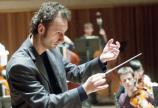Listening Without Borders
- John Threlfall

If you think a piece of music sounds the same when played by different orchestras around the world, you’re not listening internationally. Which, in a musical nutshell, is exactly what School of Music professor Ajtony Csaba had in mind when he approached UVic’s Learning Without Borders Program (LWB), which supports internationalization of the curriculum.
“When I came to UVic to work with the orchestra, I saw this ensemble had a lot of potential for development,” he explains. "The students, and the audience, could benefit by introducing them to several new international approaches to music.”
“International” is the perfect word to describe the career of the Romanian-born Csaba—not only did he train in Vienna and Budapest, but he has also conducted orchestras in Hungary, Austria, China and Syria before joining the School of Music in 2010.
“Each orchestra has its own playing style,” he notes. “The London Philharmonic Orchestra, for example, has its own style that is different from the Chicago Symphony, the Vienna Philharmonic or the Beijing Central Conservatory’s orchestra—so it will be very beneficial for our students, to learn a stylistic approach reflecting orchestras worldwide.”
Csaba’s idea was to create a four-year course more reflective of what he describes as “the multicultural state of music repertory . . . and orchestra performance and training traditions around the world.” The result is his “Internationalization of the Orchestra” course, which dovetails perfectly with the Learning Without Borders goal. Csaba is the second School of Music professor—along with Jonathan Goldman—to benefit from the LWB curriculum development fund.
With the help of this grant, we can invite guest artists from specific musical cultures, who will demonstrate the differences in these performance traditions and stylistic regions,” says Csaba. “That will provide our students with new tools that help identify and interpret in a reflective way, say, French romantic orchestral music differently than Russian romantic music.”
Think of it like translating an international novel: while the story will be the same in different languages, the word choice and tone are going to be slightly different from country to country.
“If you listen to two interpretations of one piece of music one after another, it’s obvious that something is different,” explains Csaba. “The differences one can hear in a performance are related to the ensembles—this trombone player in Spain might have a slightly different tone than the one in Russia, whose training is different. The same conductor can work with each ensemble, with the same concept, on the same repertory, but it will still sound slightly different.”
Come March 1, you can hear some of Csaba’s theories in action when the UVic Orchestra performs Dances [- and a bit of counterpoint-] without borders at the University Centre. “We will play two separate sets of dances—Rimsky-Korsakov’s Capriccio Espagnol Op. 34 and Dvořák’s Slavonic Dances Op.46—which are both cross-cultural,” says Csaba. “Dvořák is Bohemian, and ‘Slavonic’ references the folklore of the whole Slavonic population, while Rimsky-Korsakov is Russian, so he’s referencing another country entirely. They are both composing in a dance tradition which is not only related to their own culture.”
But can that sense of internationality truly be taught? “If students are exposed to many different ways of interpreting music, they will be able to go to another country and listen with a referenced ear,” Csaba concludes. “They can then compare and make a derivation from what they’re used to—and they will understand how it is different and how to reproduce it. This is an important experience preparing artistic collaborations in a multicultural society.”
ABOUT LEARNING WITHOUT BORDERS
UVic’s Strategic Plan highlights the goal of internationalizing the curriculum to prepare students for their role as global citizens. To support this goal the Provost’s Office makes available resources, through the Learning without Borders (LWB) initiative, designed to support faculty members and academic units seeking to integrate international elements into their undergraduate curriculum.
The vision for the initiative, now in its second year, is to create a growing community of multi-disciplinary faculty members and students involved in the internationalization of the curriculum, who are willing to share their experiences and inspire others through their leadership in this area. The hope is that the lessons learned will support the development of global mindsets and cross-cultural understanding of not just students, but the entire university community.
Previous LWB-supported courses have included CENG 421: Computer Vision, MUS 391: Global Music Traditions, PAAS 209: Intercultural Service Learning, EDD 423: 21st Century Africa, Latin America and Asia: Issues in Culture, Health, Policy and Democratic Development, and SLST 100: Introduction to Russian Society and Culture. Current courses include MUS 180-580: University of Victoria Symphonic Orchestra, COM 405: Career Preparation Across Borders, ED-D101: Learning Strategies for University Success, ADMN 200: International Community Development Through Activism and Capacity Building, HUMA 495/EDD423: Cross Cultural Awareness: 21st Century Africa, Asia & Latin America, with others to follow.
A pre- and post-survey, Global A’s, was constructed to measure students’ self-reported changes in global Awareness, Attitudes and Actions as a result of taking an LWB course. These were compared with results from a “control course” that had not been exposed to LWB design principles. Preliminary results are extremely positive and indicate that those students participating in the LWB-enhanced courses reported substantial positive changes in global knowledge, taking others’ perspectives, and actively seeking out information about other cultures, compared to those students in the control course who largely reported no changes.
For more information on LWB, LWB grants, and LWB courses, please visit the Learning and Teaching Centre website: http://ltc.uvic.ca/scholarships/LWBProgram.php
Photos
In this story
Keywords: Learning Without Borders, music
People: Ajtony Csaba

